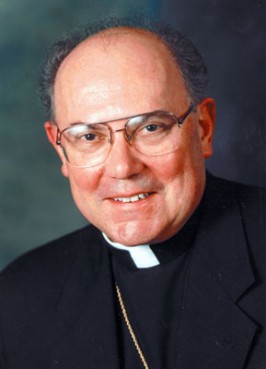(RNS) The Vatican’s highest-ranking American has joined a growing number of Roman Catholic bishops lashing out at the media for implicating Pope Benedict XVI in the failure to remove predatory priests from ministry.
Cardinal William Levada, Benedict’s successor as the Vatican’s chief enforcer of doctrine, accused The New York Times on Wednesday (March 31) of being in “attack mode” against the pope.
Writing in Catholic San Francisco, a newspaper published by the archdiocese he led from 1995-2005, Levada said The Times, “in rushing to a guilty verdict, lacks fairness in its coverage of Pope Benedict.”
Bishop Nicholas DiMarzio of Brooklyn went further in a homily on Tuesday, when he called on Catholics to “stand up with me and send a message loud and clear that the pope, our church, and our bishops and priests will no longer be the personal punching bag of The New York Times.”
“I might even suggest canceling our subscriptions to The New York Times,” DiMarzio said from the pulpit, “but we need to know what the enemy is saying.”
The blasts from the bishops are the latest salvo in an escalating campaign against The Times, which published two recent articles implicating Benedict in failures to remove abusive priests from ministry. One involved a priest from Wisconsin, the Rev. Lawrence Murphy, accused of molesting as many as 200 deaf boys in the 1950s and 60s; the other involved a priest convicted of sexually abusing minors in the pope’s native Germany. Both occurred before Benedict became pope, and the Vatican has blamed the errors on underlings.
The Murphy case shows, The Times reported on March 25, “that while church officials tussled over whether the priest should be dismissed, their highest priority was protecting the church from scandal.” Because of the newspaper’s prominence, the charges were widely repeated in news stories worldwide. On Monday, the priest in charge of the Wisconsin trial sharply disputed the Times’ account, saying that a church trial against Murphy was ongoing when he died in 1998.
The Times could not be reached for comment. UPDATE: The Times posted a chronology of the document trail Wednesday night on the Murphy case and an interview with the priest, the Rev. Thomas Brundage, in which he acknowledges that paper did not misquote him. The documents include a letter from the former archbishop of Milwaukee to the Vatican in which he writes the he instructed Brundage to halt the trial.
Since the articles were published, the Vatican newspaper has angrily reproached journalists for mounting an “ignoble attempt” to smear Benedict, a Canadian bishop has maligned the “relentless media campaign” against Catholic clergy, and the New York-based Catholic League bought a $45,000 ad in The Times accusing the paper of trying to weaken the church’s moral authority.
The criticism of The Times has been led by New York Archbishop Timothy Dolan, who has accused the paper of “anti-Catholicism” and “peddling falsehoods to destroy the Holy Father’s good name.”
“While the report on the nauseating abuse is bitterly true,” Dolan said, referring to the Murphy case, “the insinuation against (the pope) is not, and gives every indication of being part of a well-oiled campaign against Pope Benedict.”
It’s not the first time Dolan has taken on the Times. Since he moved to New York nearly a year ago, he has repeatedly accused the paper of covering sexual abuse by Catholic clergy while ignoring it when it happens outside the church, and slammed columnist Maureen Dowd for using “every anti-Catholic caricature possible.”
Unbowed, Dowd accused the Catholic Church on Wednesday of “spending Holy Week practicing the unholy art of spin.”
The bishops’ anti-media campaign misses the mark, said the Rev. James Martin, an associate editor at America, a Jesuit magazine. If the Boston Globe had not uncovered the sexual abuse scandal in 2002, the church would not have been forced to confront the problem.
“So while the media is not always accurate, and certainly not free of anti-Catholicism, the church should be very careful in blaming the messenger,” Martin said.
Paul Moses, a professor of journalism at Brooklyn College and the City University of New York, said The Times has “done a service to Catholics” by bringing documents about clergy sexual abuse to light.
“However dated most of the sexual abuse cases are,” Moses wrote on the blog of Commonweal, a Catholic magazine, “this story still calls out to be covered because some of those who failed to stop repeat abusers remain in positions of authority.”





